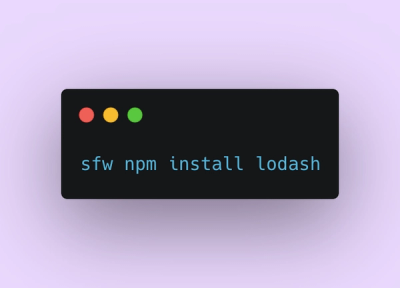
Product
Introducing Socket Firewall: Free, Proactive Protection for Your Software Supply Chain
Socket Firewall is a free tool that blocks malicious packages at install time, giving developers proactive protection against rising supply chain attacks.
@arcjet/next
Advanced tools
@arcjet/nextArcjet helps developers protect their apps in just a few lines of code. Implement rate limiting, bot protection, email verification, and defense against common attacks.
This is the Arcjet SDK for the Next.js framework.
Looking for our Node.js SDK? Check out the @arcjet/node
package.
Visit the quick start guide to get started.
Try an Arcjet protected app live at https://example.arcjet.com (source code).
npm install -S @arcjet/next
The example below applies a token bucket rate limit rule to a route where we identify the user based on their ID e.g. if they are logged in. The bucket is configured with a maximum capacity of 10 tokens and refills by 5 tokens every 10 seconds. Each request consumes 5 tokens.
Bot detection is also enabled to block requests from known bots.
import arcjet, { tokenBucket, detectBot } from "@arcjet/next";
import { NextResponse } from "next/server";
const aj = arcjet({
key: process.env.ARCJET_KEY!, // Get your site key from https://app.arcjet.com
characteristics: ["userId"], // track requests by a custom user ID
rules: [
// Create a token bucket rate limit. Other algorithms are supported.
tokenBucket({
mode: "LIVE", // will block requests. Use "DRY_RUN" to log only
refillRate: 5, // refill 5 tokens per interval
interval: 10, // refill every 10 seconds
capacity: 10, // bucket maximum capacity of 10 tokens
}),
detectBot({
mode: "LIVE", // will block requests. Use "DRY_RUN" to log only
// configured with a list of bots to allow from
// https://arcjet.com/bot-list
allow: [], // "allow none" will block all detected bots
}),
],
});
export async function GET(req: Request) {
const userId = "user123"; // Replace with your authenticated user ID
const decision = await aj.protect(req, { userId, requested: 5 }); // Deduct 5 tokens from the bucket
console.log("Arcjet decision", decision);
if (decision.isDenied()) {
return NextResponse.json({ error: "Forbidden" }, { status: 403 });
}
return NextResponse.json({ message: "Hello world" });
}
Arcjet Shield protects your application against common attacks, including the OWASP Top 10. You can run Shield on every request with negligible performance impact.
See the Arcjet Shield documentation for details.
import arcjet, { shield } from "@arcjet/next";
import { NextResponse } from "next/server";
const aj = arcjet({
key: process.env.ARCJET_KEY, // Get your site key from https://app.arcjet.com
rules: [
shield({
mode: "LIVE", // will block requests. Use "DRY_RUN" to log only
}),
],
});
export async function GET(req: Request) {
const decision = await aj.protect(req);
if (decision.isDenied()) {
return NextResponse.json(
{ error: "Forbidden", reason: decision.reason },
{ status: 403 },
);
}
return NextResponse.json({ message: "Hello world" });
}
Reference documentation is available at docs.arcjet.com.
Licensed under the Apache License, Version 2.0.
1.0.0-alpha.29 (2024-11-19)
node:process (#2156) (346a350), closes #2154getTimeLabel function (#2140) (73d94d5)FAQs
Arcjet SDK for the Next.js framework
The npm package @arcjet/next receives a total of 13,365 weekly downloads. As such, @arcjet/next popularity was classified as popular.
We found that @arcjet/next demonstrated a healthy version release cadence and project activity because the last version was released less than a year ago. It has 3 open source maintainers collaborating on the project.
Did you know?

Socket for GitHub automatically highlights issues in each pull request and monitors the health of all your open source dependencies. Discover the contents of your packages and block harmful activity before you install or update your dependencies.

Product
Socket Firewall is a free tool that blocks malicious packages at install time, giving developers proactive protection against rising supply chain attacks.

Research
Socket uncovers malicious Rust crates impersonating fast_log to steal Solana and Ethereum wallet keys from source code.

Research
A malicious package uses a QR code as steganography in an innovative technique.